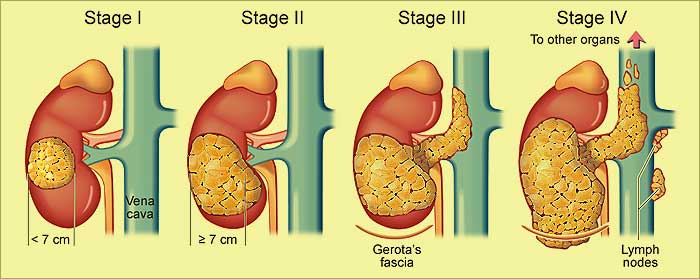
Kidney cancer, also known as renal cancer, refers to the development of cancerous cells in the kidneys. The kidneys are crucial organs responsible for filtering waste products from the blood and producing urine. There are several types of kidney cancer, with renal cell carcinoma (RCC) being the most common form.
Causes and Risk Factors
- Age: The risk of kidney cancer increases with age, and it is more common in people over 40.
- Gender: It is seen that men are at a higher risk of developing kidney cancer than women.
- Genetic Factors: Certain inherited conditions, such as von Hippel-Lindau (VHL) syndrome, increase the risk of kidney cancer.
- Occupational Exposure: Certain jobs with exposure to certain chemicals and substances may elevate the risk of developing renal cancer.
Symptoms

Blood in the urine (haematuria)
This is a common early symptom of kidney cancer.

Persistent pain in the back or side
Pain may be a sign that the cancerous tumour is growing gradually.

Sudden weight loss and fatigue
These can be symptoms of advanced kidney cancer.
Diagnosis
- Imaging Tests: CT scans, MRIs, and ultrasounds are used to visualize the kidneys and detect cancerous tumors.
- Biopsy: A sample of tissue is taken for examination to confirm if it is cancerous.
Treatment
- Surgery: The primary treatment is often the surgical removal of the tumor or the entire kidney.
- Immunotherapy: Drugs that stimulate the immune system to target and destroy cancer cells.
- Radiation Therapy: High-dose X-rays or other forms of radiation can be used to kill cancer cells or slow their growth.
Prevention
- Quit Smoking: Stopping or quitting smoking can reduce the risk of kidney cancer.
- Maintain a Healthy Lifestyle: Adopting a healthy lifestyle can also help lower the risk.
If you or someone you know is experiencing symptoms or at risk for kidney cancer, it is important to consult Dr. Amit Ghose for proper evaluation and guidance.
Other Cancer Diseases




 Disclaimer : This trust is not involved with Kidney Transplantation or Donation
Disclaimer : This trust is not involved with Kidney Transplantation or Donation